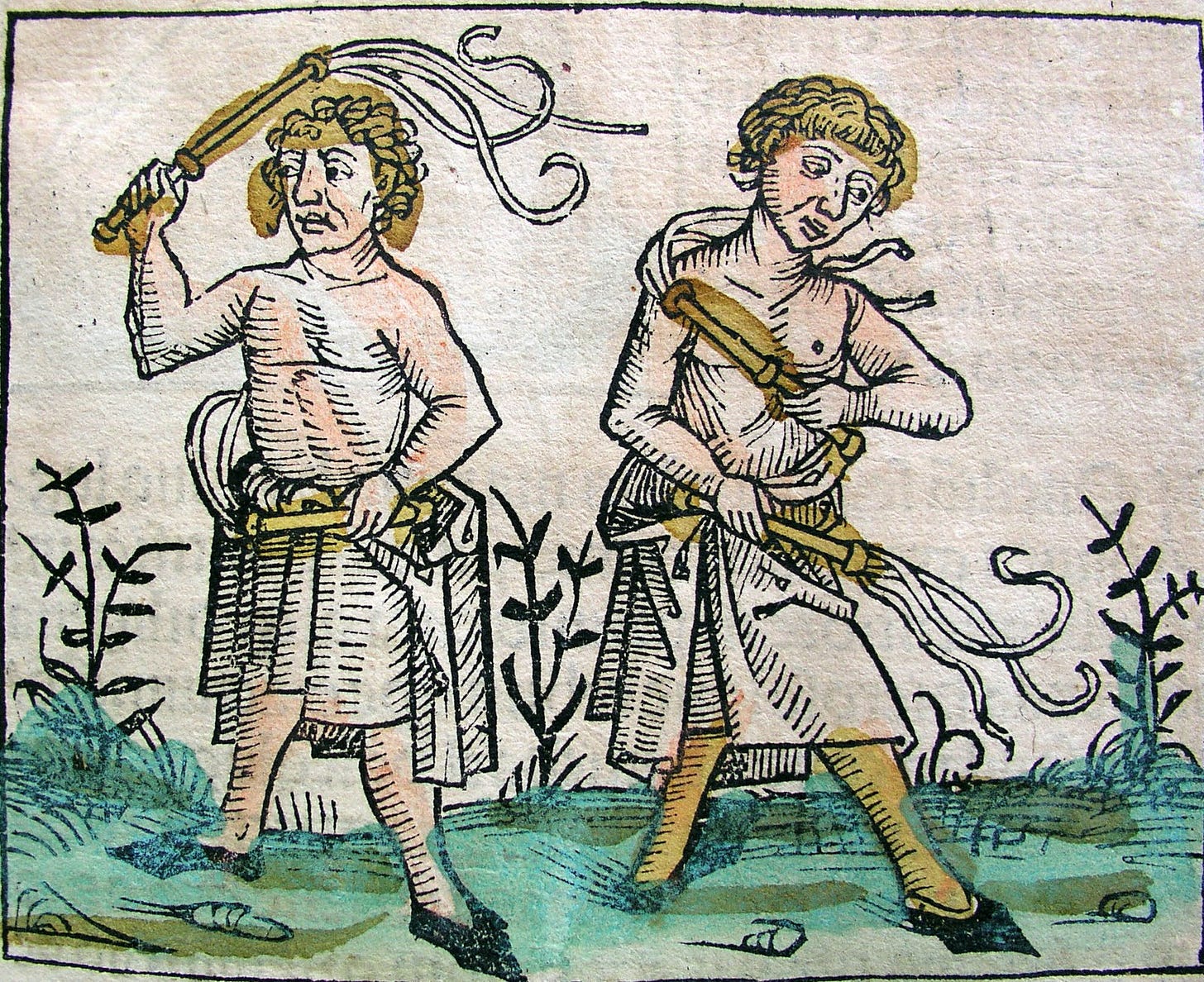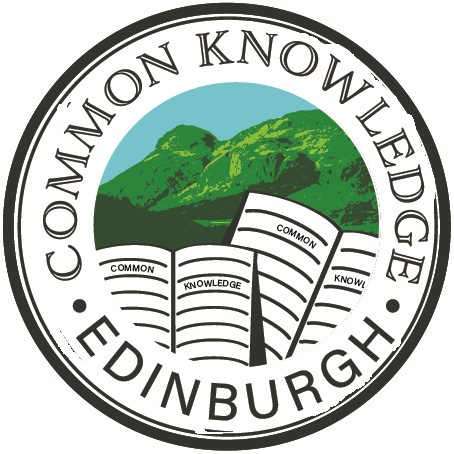17th March, Edinburgh - Mark Devlin! Mark is a UK-based club and radio DJ and music journalist, specialising in black/dance music in its many forms. In recent years Mark has begun speaking about the dark forces that have been manipulating the music industry for decades. Mark has been an independent and courageous voice for truth and human freedom. Book a ticket here. (£10)
I was cycling my bike along one of Edinburgh’s former railway lines, now a walkway used by strollers, dog walkers and bicyclists, last week. Unfortunately, my brakes are a bit worn so braking is more like a prolonged deceleration than a sudden stop (a piece of maintenance which I should do something about, but I’m lazy). It is an omission and lapse which almost led to harm when faced by a dog running around the path in a haphazard manner. In this instance, I did reduce my speed sufficiently to be able to glide around it when it, after starting in one direction, turned and bounded in another, putting it directly in my route. However, my evasive manoeuvres were not to the satisfaction of the two young female companions of the dog, one of whom started to rant at me for my bike’s proximity to their canine, with the other one telling me to ‘F*** O**!’. The decline of manners, ah well.
This insignificant incident reminded me of many of writings of political influencers over the past thirty years, especially those who decried the state of the populace: its habits, its attitudes, its manners. The intellectuals in journals or books that most people never hear of but are widely read in the circles of those who orbit power, and which make such sweet reading and repeating to the hegemonic class as they support that particular group’s prejudices, have been criticising the average person for a long time now; sometimes justly, sometimes unjustly.
My encounter with the two young women would probably be categorised by these thinkers as the deterioration of everyday life and the ‘death civility’; a symptom of a deeper illness, the decadence of an elite strata that is failing in its role of imposing order on the feckless, ill-disciplined masses. Most people, the enunciators of the elevated class argue (nowadays using the language of the technocrat as opposed to the paternalistic prose of previous times) cannot take responsibility for themselves and must have their lives defined for them. Circumstances have caused a falling off in what used to be called ‘character and the situation of people’s lives must be re-engineered to make life harder, thereby making them less unpleasant to others and to themselves.
In previous time, more condemnatory language may have been applied: a ‘cornucopia of vulgarity’ and ‘sin’ is how a more archaic moralist might denounce many interactions of today. These antiquated terms are informed by an older template of thought; a worldview, although removed from us as it us, remains rich in ideas and those concepts help identify emotional patterns which give us an understanding of aspects of today’s world. That we the People are inveterate sinners who need constantly guided away from our natural proclivities, is perhaps a clearer, more comprehensible paradigm of how we are perceived by the commanding class, while also providing a needed challenge to our contemporary assumptions articulated in the United States Constitution about the sanctity and permanence of our rights and draws for us an outline of shapes in the future’s misty haze of what might come next.
To wit, in the drama Richard the Third, the eponymous central character is presented by Shakespeare as a Moral Scourge ; an old Christian Medieval idea that was used to explain the reign of cruel and arbitrary rulers and often used in the Mystery Plays of the previous age. Tyrannical government then begged a simple question. ‘How could a good God allow such an evil to befall people?’ puzzled Christian Fathers and theologians in the Middle Ages. Because they deserved it, is the explanation the Moral Scourge concept allows. In Shakespeare’s play, Richard the Third is characterised as a villain, but he is not a villain in the larger context of Justice. He seduces Lady Anne beside her husband’s corpse who he himself murdered - she desiring status and preference in place of her morality or dignity - then rids himself of her; he kills his enemies as they fight for their own share of power, happily betraying one another, while the nobles show a fawning obedience to his rule. Each person gets what they deserve, delivered to them by Richard until he himself is delivered unto the Next Realm at the end of the play in Bosworth Field.
Russia’s Ivan the Terrible came to believe himself to be a moral scourge; his cruel dominion, the bloodthirsty terror of the Oprichnina, a retribution for the many wrongs of the Russian people. He was emulated in this by his distant successor Stalin. Stalin and his monstrous reign can be understood far more easily in a Christian archetype much more so than in a pragmatic and materialistic communist one, in fact, the former seminarian understood it that way himself.
He had been been beaten by his parents, grew-up in a violent village, lied to and beaten at his seminary, marginalised by the equality-chanting revolutionaries, dismissed and betrayed by Trotsky, betrayed by Lenin, and marked for arrest then execution during the Revolution by his own comrades, all giving him a jaundiced gaze on human nature and its ‘ideals’. His creation of a society where everyone watches everyone else, informs on everyone else, betrays everyone else, with the punishing and torturous gulags for those that erred, followed by, in most cases, the ultimate sanction of death was more than just simple political pragmatism; in Stalin’s paranoid mind, these were harsh moral correctives, as callous and inhumane as Medieval castigations intended to exert retribution for an affronted God, for a society that had lost its way, for one that offended him. It was revenge.
The Moral Scourge acted as flagellator to the masses’ role as flagellant: an attempt to expiate sin through repeated suffering, and, like many a flagellant, the debt of sin was never to be cleared except through death, and not even then. It is a concept born from a grim world of suffering where human desire, or free thought, cannot go unpunished.
From our perspective, many centuries removed, we perhaps discern more cynically the encouragement of such self-despoiling by institutions such as the Church and powerful nobles as a form of social control which utilised the psychological disfigurement of poverty, insecurity, a lack of education and powerlessness to push a self-denying ideology that protected the status quo. It was a social arrangement that kept the preponderance of humanity down, the mind’s eye turned inward looking for fault, an introverted narrowing of the soul. Nevertheless, caveats accepted, can we truly say we have enlightened ourselves beyond the grasp of petty-mindedness, irrational fear and immoral appetites?
In our era, the weaknesses of the masses have provoked a backlash in elite circles, has done for many decades, now however, its practical intensification is in full swing. The proposed role of the majority is to submit to a higher authority and be codified, classified and categorised to permit the smooth transition of their person through a regulated, digitised society. AI and technology will organise their lives; they will be allowed what they are allowed and they will be managed in order that, ultimately, to use Winston Churchill’s phrase that succinctly summed-up his post-war aims, ‘rich men will be at peace in their habitations’. Not being disturbed by the ‘too many’, their covetousness and their coarseness...or their imagination or invention.
This sounds abhorrent to anyone that believes in genuine progress, democracy, the dignity of human beings and still holds onto ideas as, if not completely ‘free’ then, an individual will and a choice that is allowed to rationalise naturally without external interference manipulating an outcome desired by someone else. Yet that optimistic view of mankind, instilled by the Renaissance and supported by the Enlightenment, is being challenged by…mankind itself, who seems, very often, determined to collaborate with its oppressor and live up to the feudalistic caricature that makes elites so readily despise the plurality of persons, thus encouraging their ruthlessness, criminality and murderousness.
Do we need to embrace the specific facet of Medievalism summarised so well by the Seven Deadly Sins? Do we need to eat so much junk food? Watch so much Netflix? Exercise so little? Take so many photos of ourselves? Throw so much litter? Be so quick to ‘righteous’ anger? Devote time to nonsense and ignore the important and worthwhile? Be so indifferent? Be so powerless? A society plagued with such failings is bringing trouble upon itself.
Exerting itself through the appearance and actions of the Moral Scourge was, of course, the universal principle of evil. Ironic, as it was the Universal Principle of Evil that was animating the bulk of the citizenry in their wickedness. It seems, Evil was playing both sides. How…Evil.
Yet, if we put the metaphysical aside for a moment, we can see that, even in a material world, the excesses of consumerism, corporate greed and individual egotism/insecurity are going to invite a reaction, will, necessarily, call for a response. The only hope to avert a ‘moral scourge’, whether as a ruler, a class of people or a series of disastrous events brought about in part by ourselves, is a public dialogue that is transparent and honest, followed by a commitment to action.
While we are waiting around for that grand ‘public’ event, it might be an idea to find ways to act now, and, if there are metaphysical powers in the universe, appeal to the more beneficent dynamics of them by way of our actions, in the hope that by doing so we outgrow the need for chastisement by cosmic potentates or earthly ones, and instead strive to bring about a more mature, reasoned and prosperous future for all of us.
We have now moved to a paid subscription model for the Common Knowledge Blog. Most of the posts will remain free, but we are hoping that people who share the values of a free, pro-human future will support us. All the money we receive goes to our campaign for that free, human future. You can contribute by a paid subscription to this substack of £10 a month or a £100 annual membership.






Thanks for this thought-provoking article.
It is an interesting idea to consider Stalin’s excesses as being (at least partly) an expression of his perhaps never truly abandoned Orthodox faith, or at least his seminary training. In this view, he is the avenging angel on a recalcitrant, undeserving people; and so, his past disappointments with their apostasy, rather than his vision of a shining future frustrated, is the source of his demonic, chastising energy. Whether recognised as this or not, this was a view that, alas, found ready adherents among the Judeo-Bolsheviks that drove the revolution.
We have the exact same drivers of our global revolution, but I wonder who will be its Stalin? (Wee Nic was shaping up nicely, I believe, until she met her own version of the sudden firing squad).